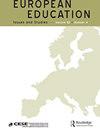横向分化事项:高中教育类型对学生转型的调节作用
IF 0.9
Q4 EDUCATION & EDUCATIONAL RESEARCH
引用次数: 3
摘要
本文探讨高中教育的横向分化如何影响学生毕业后的过渡。它建立在对教育的制度视角上,并借鉴了一项具有全国代表性的调查的数据。分析表明,不同的中等教育类型对毕业生的过渡模式有很大的影响,中等教育项目的类型调节了学业成绩和学生社会经济背景对学生过渡模式的影响。本文章由计算机程序翻译,如有差异,请以英文原文为准。
Horizontal Differentiation Matters: Moderating Influence of the Type of Upper Secondary Education on Students’ Transitions
This article explores how the horizontal differentiation of upper secondary education affects students’ transitions after graduation. It builds upon the institutional perspective on education and draws on data from a nationally representative survey. The analysis shows a considerable variation in graduates’ patterns of transition according to the type of secondary education and that the type of secondary education program moderates the effect of the academic achievement and of students’ socioeconomic background on students’ patterns of transition.
求助全文
通过发布文献求助,成功后即可免费获取论文全文。
去求助
来源期刊

European Education
EDUCATION & EDUCATIONAL RESEARCH-
CiteScore
1.20
自引率
0.00%
发文量
5
期刊介绍:
uropean Education is published in association with the Comparative Education Society in Europe (CESE). It is an international peer-reviewed journal devoted to original inquiries and dialogue on education across the member states of the Council of Europe. Established in 1969, the journal features articles on education in individual member states, comparative studies on education across Europe, as well as the impact of European education initiatives globally. The journal especially encourages theoretical and empirical studies, interdisciplinary perspectives, and critical examination of the impact of political, economic, and social forces on education. European Education includes reviews of books and educational films, including those published/produced in English and other languages.
 求助内容:
求助内容: 应助结果提醒方式:
应助结果提醒方式:


